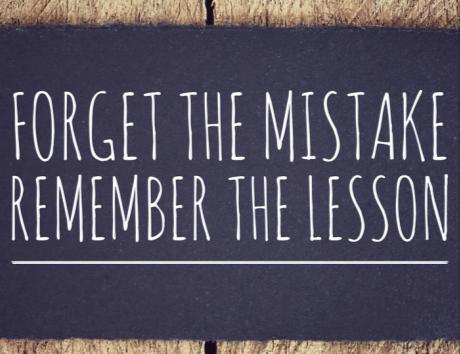The 10 Most Common CV Mistakes to Avoid
Your CV is the first impression an employer or recruiter will have of you. If that first impression is not a good one, you can say goodbye to landing an interview. However, no matter how carefully you look over your CV, a mistake is easily made. So what should you pay attention to? To help you on your way, we’ve compiled the 10 most common CV mistakes.

Once a mistake is made, no matter how small, the damage is done. Even if you’re a qualified candidate, a typo here and there could mean the difference between an interview and a missed opportunity. To ensure that your CV makes it past the gatekeepers (ATS, HR teams) and into the hiring manager’s hands, here are the most common pitfalls to avoid:
1- Spelling and grammatical errors
Mistakes can happen; however spelling and grammatical mistakes look sloppy. They show that you didn’t care enough to check your CV before sending it off.
Don’t rely on spellcheck alone. Spellcheck will catch misspellings, but will often miss correctly spelled words that have been used in the wrong context.
Your best bet is to get a fresh pair of eyes to look over your CV. Ask a trusted friend, colleague or family member who may spot any errors you may have missed. Ask them to pay special attention to capitalisation and tense consistency.
2- An unkempt layout
Recruiters spend seconds scanning your CV. To make it easy for them to find the information they need, your CV needs to be well-structured and have a clear format.
This includes selecting a standard font (e.g. Times New Roman, Arial, Verdana), use appropriate font sizes (no smaller than 10) and leaving plenty of white space between sections. Bold formatting for headings and 1” margins can also help to make your CV look well-presented.
If you want to save some time, consider using a CV builder such as Jobseeker. You can choose from 8 professional templates, available in any colour, for a beautiful and neat layout. Once you’ve filled in relevant sections, your CV can be downloaded immediately and is ready for use.
EXPERT TIP
3- A CV that is too long
Even though you may have plenty of work experience, knowledge and skills, your CV should ideally not exceed 2 A4 pages.
If you have a long career history, you can omit or bundle work experience from more than 15 years ago; often this information is not as relevant as recent positions.
You also don’t have to go into great detail for every position. Focus on results and roles where you made an impact. If further information is required, you can always elaborate in interviews.
4- A generic CV
A generic CV may help you to apply to as many job applications as possible, but this is an ineffective approach. Recruiters and hiring managers will sense that you’re not really interested in the position or the company and that you’re after any job.
Each job description has a different set of requirements and criteria and therefore, your CV needs to be tailored to each individual vacancy.
If your CV doesn’t make it clear why you’re a suitable candidate for the specific job, then it’s not doing its job. It’s worth taking the time to go through the job description as well as visiting the company’s website to get a feel for the kind of person they’re looking for.
5- Not enough focus on your results and accomplishments
One of the most common CV mistakes is to simply list the responsibilities you had for each of your job roles. However, this only lets employers know what you did, rather than how well you performed in each job.
By focusing on achievements and results, you stand out from other candidates. For example, if you worked as a customer service representative, did you answer all emails within a specific amount of time? Perhaps, as a project manager, you saved the company money by sourcing cheaper vendors
The following formula is a good way to think your achievements and results: skill + activity + quantifiable result.
For instance, as a sales manager, you used your negotiation skills to increase sales by 20%.
6- Keyword stuffing or overuse of buzzwords
Including keywords from the job description can help get your CV past the ATS filter. However, if you cram too many keywords into your CV, this will look suspicious and may cause recruiters to wonder whether you really possess all the skills you say you have.
The same applies for buzzwords. These are words such as ‘hardworking’, ‘flexible’ ‘motivated’, ‘detail-oriented’, etc, which don’t really say anything about your experience or skills. Instead, it’s better to use ‘active verbs’ that describe the impact of your actions.
7- Lying on your CV
Tempted to lie on your CV? Don’t do it! Whether you’re thinking of exaggerating your language skills or making up qualifications, it’s never a good idea as you will almost certainly be found out. In some cases, it could be considered a criminal offence if the lie leads to you securing a well-paid role.
So, keep your integrity and don't 'pimp' your CV with big or small lies.
8- An inappropriate photo
Including a photo on your CV is not required for most applications; however, a photo can add a personal touch if you’re applying for an acting or modelling role.
Not every photo will be suitable for use in a CV. Holiday, party and nightlife photos may show your personality but are completely inappropriate in a professional setting. The best photo to use is one in which you have a neat and professional appearance and you smile. As it can be hard to get right, consider using a professional photographer.
9- Incomplete or missing contact information
If your CV is missing important information such as phone number and email address, recruiters will find it hard to get in touch with you. Furthermore, they won’t appreciate the implication that they have to hunt for your contact information to talk to you.
Make sure your email address is appropriate and conveys the right impression. An email address such as milou_likes_to_party@example.com or ilovedogs@example.com might be funny to your friends, but is inappropriate in a professional setting. To be on the safe side, use an email address that contains your first name and your last name such as sarah.smith@example.com
10- A non-representative online profile
Be aware that employers and recruiters will look you up online when you submit your application. Therefore, it’s important that your online presence is representative of the professional image that your CV (hopefully) conveys.
That’s why it’s a good idea to check the privacy controls on your social media accounts and remove anything you don’t want employers to see from the public domain.
Final thoughts
You only get one chance to make a first impression. So, make sure that the first impression your CV gives is a good one. Use one of our resume templates to ensure a professional presentation of your skills and work experience. Good luck with applying!
Impress employers with your CV
Step-by-step guidance to create a professional CV in minutes.



